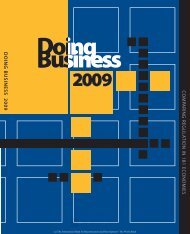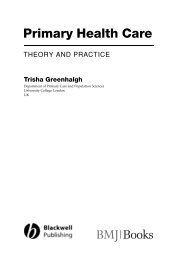Download File - JOHN J. HADDAD, Ph.D.
Download File - JOHN J. HADDAD, Ph.D.
Download File - JOHN J. HADDAD, Ph.D.
You also want an ePaper? Increase the reach of your titles
YUMPU automatically turns print PDFs into web optimized ePapers that Google loves.
58 Srinivasan<br />
expressing various known tumor antigens (12). Canvaxin TM has the potential<br />
benefit of viable but nonreplicating cells so that they may continue to express<br />
and present antigen. Tumor-cell profiling by flow cytometry indicated the<br />
expression of gangliosides, tyrosinase, TRP-1/gp75, Melan-A, and gp100. The<br />
assurance that irradiation of the final product is effective and that cells have been<br />
rendered replication-incompetent is of critical importance for allogeneic tumor<br />
whole-cell vaccines. This was achieved at irradiation doses at which the cell<br />
could not replicate while maintaining antigenic integrity.<br />
Canvaxin TM was extensively tested in phase 1 and 2 clinical trials with the<br />
results indicating a statistically significant increase in median and five-year<br />
survival of stage III and IV surgically resected patients with melanoma when<br />
compared with matched historical controls (13,14). The promising clinical<br />
benefit was correlated with vaccine-induced immune responses (11,15–18).<br />
Early phase 2 nonrandomized clinical trial results indicated a strong cellular<br />
delayed type hypersensitivity (DTH) along with high anti-TA99 IgM and anti-<br />
GD2, -GD3, -GM2, and -GM3 ganglioside IgM titers in patients with resected<br />
melanoma (19). Serum complement–dependent cytotoxicity for melanoma cell<br />
lines in vitro also increased over baseline levels when patients were administered<br />
this polyvalent vaccine (15). Canvaxin TM was tested in a postsurgical adjuvant<br />
setting in large double-blinded, randomized phase 3 trials for AJCC stage III and<br />
IV melanoma (20,21). The trials compared patients vaccinated with either<br />
Canvaxin TM or placebo, with both arms having received BCG with the first two<br />
doses. All patients were observed for overall survival (OS) and disease-free<br />
survival (DFS). In spite of encouraging immune responses to Canvaxin TM in<br />
early studies, both trials were discontinued because the independent Data and<br />
Safety Monitoring Board found that the data were unlikely to provide significant<br />
evidence of an OS benefit for these melanoma patients treated with Canvaxin TM ,<br />
when compared with those on the control arm (6,22,23). The control arm in these<br />
pivotal trials, which included BCG without the allogeneic cell component of the<br />
vaccine, did better than expected. The vaccinated patients in phase 1 and 2 trials<br />
were compared to matched historical controls that did not receive BCG.<br />
Autologous tumor vaccines, with BCG as a component, have been shown<br />
to be effective in randomized trials for stage II and III colon carcinoma (7,24,25).<br />
While the importance of randomized phase 2 trials is becoming increasingly<br />
recognized and implemented, it is perhaps crucial when immune adjuvants form<br />
a component of the vaccine regimen.<br />
Allogeneic Tumor-Cell Lysate<br />
These vaccines are conceptually similar to whole-cell vaccines, except that<br />
protein and other cellular components from the lysate serve as the immunogens.<br />
Melacine 1 is a mechanically disrupted cell lysate from 20 10 6 tumorcell<br />
equivalents of two allogeneic melanoma lines given with a proprietary

















